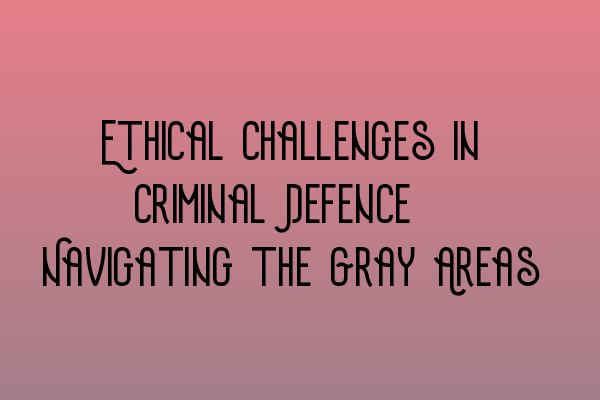Ethical Challenges in Criminal Defence: Navigating the Gray Areas
As a Criminal Defence solicitor, one is often confronted with ethical challenges that arise in the practice of law. Criminal cases are complex and riddled with intricate legal and moral questions. Navigating these gray areas requires a delicate balance between upholding ethical principles and providing zealous representation for clients.
One of the key ethical challenges faced by criminal defence lawyers is the duty to maintain client confidentiality. This duty is sacrosanct and forms the foundation of the solicitor-client relationship. Clients must have confidence that they can divulge sensitive information to their lawyer without fear of it being disclosed. However, this duty can clash with a solicitor’s duty to disclose information in the interest of justice.
Consider a scenario where a client confesses to a serious crime during a consultation. The solicitor is duty-bound to maintain confidentiality, but what happens when this information could potentially prevent harm to others? Balancing the duty of confidentiality with the duty to prevent harm is a difficult ethical tightrope to navigate.
Another ethical challenge faced by criminal defence solicitors is the duty to act in the best interests of the client while upholding the integrity of the legal system. This can be particularly challenging when defending clients who are clearly guilty or have engaged in morally repugnant acts.
Defending someone accused of a heinous crime like murder or sexual assault can test a solicitor’s commitment to their ethical obligations. While all individuals are entitled to a fair trial, defending a guilty client can raise feelings of moral conflict. It requires a deep understanding of the principles of justice and the importance of due process.
Furthermore, the solicitor’s duty to act in the best interests of the client can clash with their duty to the court. A solicitor must never knowingly mislead or deceive the court, even if it means potentially harming their client’s case. This can be a challenging ethical dilemma, as the lawyer is torn between advocating for the client and upholding the integrity of the legal system.
Another gray area in criminal defence practice lies in the use of evidence. It is crucial for solicitors to have all relevant evidence at their disposal to mount an effective defence for their clients. However, obtaining evidence through questionable means or engaging in unethical practices to uncover information can cast doubt on the integrity of the case.
For example, some solicitors may face the temptation to gather evidence illegally or coerce witnesses into providing false testimony. Such actions not only compromise the solicitor’s professional ethics but also undermine the legitimacy of the criminal justice system. Navigating this gray area requires a commitment to adhering to ethical principles, even in the face of pressure or temptation.
In conclusion, ethical challenges abound in the world of criminal defence. Solicitors must walk the fine line between zealously representing their clients and upholding their ethical obligations. Whether it is maintaining client confidentiality, balancing the duty to act in the client’s best interests with the duty to the court, or navigating the gray areas of evidence gathering, criminal defence solicitors face a myriad of ethical dilemmas. It is through a commitment to ethical conduct that we can ensure the integrity of the legal profession and the pursuit of justice.
For further reading on related topics, you may be interested in the following articles:
